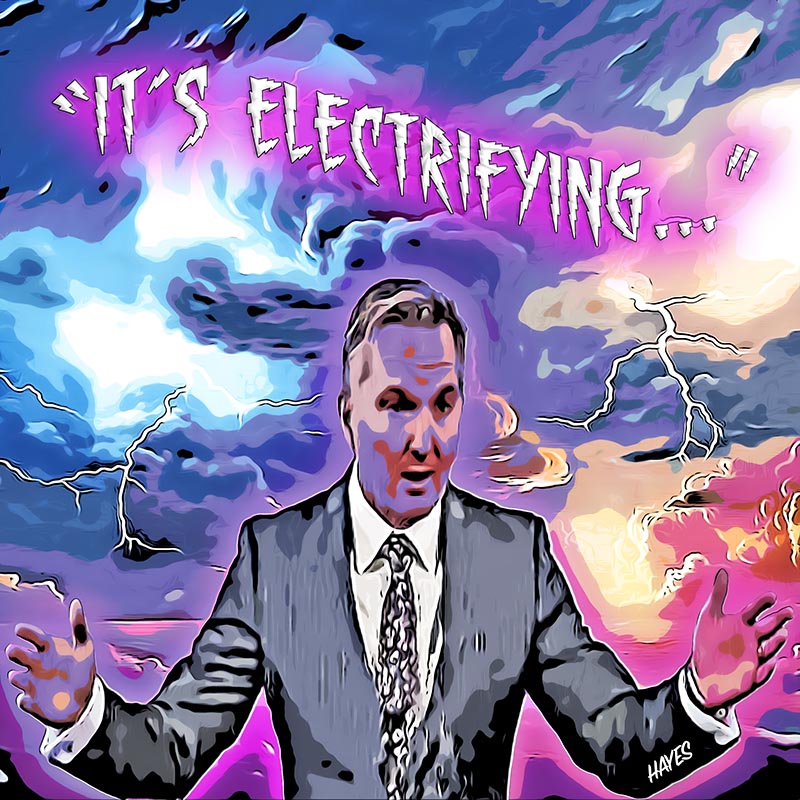
An electrical short circuit
Last week the energy regulator released its draft determination for what consumers in eastern Australia will pay to keep the lights on in 2024/25 – but will the Minister for Climate Change and Energy, Chris Bowen’s announcement have any real benefit for Central Coast households, struggling to put food on the table and to keep the lights on? As one aged-pensioner said, “it’s like getting a $50.00 discount on the purchase of a Rolls Royce.”

The political spin-machine cranked up last week with Chris Bowen’s 'electrifying' announcement on energy prices coming down, yet it would appear that it will have little, if any, real benefit to 'Coasties' struggling with the cost of living crisis.
27 March 2024
ALAN HAYES
ACCORDING to the energy price regulator, power bills for hundreds of thousands of residents and businesses in Australia's east could fall, while others will rise below the inflation rate. But will the price cap on how much retailers can charge have a significant impact in lowering the cost of living? The alleged mixed-bag of savings is another ‘electrifying proclamation’ that may allow consumers to splurge on a medium-priced bottle of wine every three months to help alleviate the misery of ‘how to make ends meet’, providing the cost of wine doesn't go up.
Residential customers without controlled load will see prices decrease by between 3 per cent to an increase of 0.9 per cent. Customers with controlled load will see prices drop between 0.4 per cent to 7.1 per cent. It was reported that Central Coast households, who come under the Ausgrid network, can expect to receive an annual savings of around $53.00 from their electricity bill.
Yet despite the token handout, the ‘spin-machine’ was cranked up last week with Chris Bowen still defending his government’s energy record. At a press conference on Tuesday 19 March, he said that while there was "a long, long way to go" the fact that wholesale prices had eased and bills had stabilised was an encouraging sign.
Minister Bowen said, however, that it was too early to predict if the government will be able to hit that target.
He attributed some of the wholesale price falls to measures put in place by the Commonwealth, including price caps for coal and gas that were introduced during the crisis, will work.
When faced with questions over Federal Labor's pre-election pledge to reduce power bills by $275 a year, Mr Bowen stood firm, despite the ground breaking away beneath him.
"We're not giving up on the plan for cheaper electricity for Australians.”
Experts say the government could be doing more to lower energy costs during the transition period to cleaner energy.
Shadow Energy Minister Ted O'Brien was less charitable, accusing Labor of breaking its promise to cut electricity bills.
Mr O'Brien called on the government to apologise over what he said was a breach of trust.
“Australians are now paying among the most expensive bills in the world," Mr O'Brien said.
It is little wonder that many Coasties, who were polled about the announcement, are still scratching their heads as to why the Minister believes that his announcement is something to get excited over. Waiting for Australian power prices to come down is now a futile exercise, because all they got from Bowen’s ‘electrifying revelation’ was a real fizzer.
So, it would now seem to be a certain bet that there will be virtually no major change to electricity prices in 2024-2025, despite the fact they’ve risen by 30-40 per cent over the past two years and wholesale prices have dropped in the meantime by 44-64 per cent.
Yet despite this, Australian Energy Regulator (AER) chair Clare Savage Clare pointed out that costs in other parts of the electricity system were still going up, driven, in particular, by investments needed for the energy transition.
Key among these was the poles-and-wires network, which typically accounted for the biggest share of an electricity invoice.
"We know that economic conditions have put pressure on many Australians and the increases in electricity prices over the past two years have made energy less affordable for many households," Ms Savage said.
But Clare Savage still maintains that, despite the ‘slap-in-the-face’ electricity discount, the regulator placed increased weight on protecting consumers given the increasing cost of living. This then begs the question – how could she come to this conclusion. As chair of the AER, she wouldn’t be fraught with the same concerns of those on struggle-street - how the next energy bill will be paid?
Member for Robertson, Dr Gordon Reid said "the Government has been clear to the AER that at this time of heightened cost of living pressures, we expect them to prioritise consumers in setting the DMO, and we are confident that is the approach they are taking.
"The AER has been clear that the Albanese Government's Energy Price Relief plan has been successful in bringing down wholesale prices, which has resulted in substantially lower costs for households, including through the DMO.
"The Liberals voted against energy price relief (and, by extension, for a higher DMO). It’s up to Peter Dutton to explain why he voted against easing power prices for Australians and businesses."
Emma McBride, Member for Dobell, was also contacted for comment on the 'power bill' announcement and asked "Will this reduction have any real impact on those households struggling with the cost of living in Dobell?" The Grapevine did not receive the courtesy of a reply.
Gavin Dufty, the manager of policy and research at St Vincent de Paul, said there was still plenty of pressure on electricity prices and it was too early for consumers to celebrate.
Mr Dufty said the slow decline of prices reflected the adage of "rockets and feathers", which refers to the tendency in economics for prices to rise quickly but fall slowly.
"I wouldn't be cracking champagne corks at the moment," Mr Dufty said.
Tim Buckley, the Director of Public Interest Think-tank Climate Energy Finance, who works probono in the public interest to accelerate decarbonisation, said that there were actions that can be taken in the meantime to lower energy prices even further. He suggested replacing appliances could bring electricity bills down - induction cookers and water heating was at the top of his list.
Now let’s be realistic here – people struggling to cope with the current cost of living crisis will not be in a position to invest in high-cost ticket items such as a new stove and water heater.
So, the problem remains – the meagre 'Rolls-Royce-purchase-discount' will still see a great majority of Coasties battling to pay their energy bill.
A final decision by the AER will be published in May with the new prices to take effect in July.








.jpg?crc=4257584689)










_web.jpg?crc=282450513)



